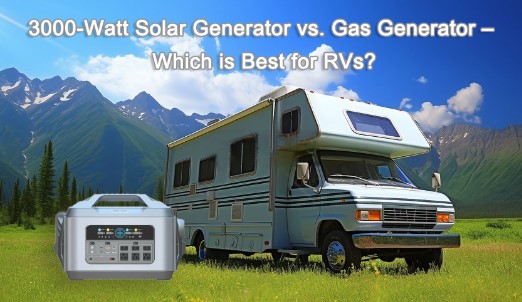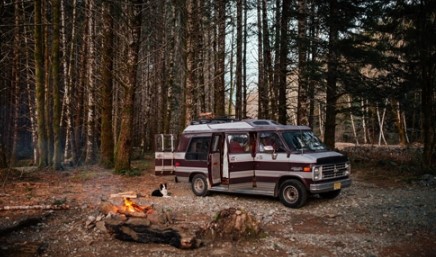When you’re on the road with your RV, the quest for reliable power can sometimes feel like a never-ending puzzle. For some, it’s just about keeping things charged—your phone, laptop, or camera. But for others, it’s a matter of making sure everything from your air conditioner to your coffee maker keeps running smoothly. That’s where a 3000W solar generator comes into play. Let’s dive into what makes it a game-changer for RV travelers.
The Need for Reliable Power
If you’ve ever spent a night at a remote campsite or driven along winding mountain roads, you know how crucial it is to have reliable, continuous energy. But it’s not just about having power—it’s about having the right kind of power. As RV owners, we know the pain of constantly worrying about fuel consumption, noise, and maintenance from traditional gas generators. The real question is: can a solar generator truly replace that noisy, fuel-hungry alternative?
Why Opt for Gasoline Generators?
In the early days of my travels, I turned to gasoline generators. They were affordable, easy to use, and got the job done in terms of providing power. But over time, I started noticing the cracks in the foundation. Sure, they could keep my lights on and devices charged, but as my adventures became more off-the-grid, those gasoline generators didn’t seem so perfect.
The Problem with Gas Generators
Noise
One of the biggest issues with gas generators is the noise. After a long day of hiking or driving, the last thing you want is the constant rumbling of a generator that competes with the tranquility of nature. Gas generators can be incredibly loud, making it hard to unwind and enjoy the peace and quiet of the outdoors.
Fuel Woes
Fuel dependency is another pain point. Gas stations in remote areas are few and far between, and if you’re traveling in the middle of nowhere, you might find yourself praying that the generator will last until the next station. The challenge is real: running out of gas in an isolated location is the last thing you want to deal with.
Maintenance Headaches
There’s also the matter of maintenance. During one trip, a leaking oil disaster left me stranded in a remote location with no mechanic nearby. Fixing a generator on the road wasn’t a fun experience. It got me thinking: is there a more reliable, hassle-free alternative?
Making the Switch to Solar: A New Era of Power
The turning point came on a rainy afternoon when I realized my gasoline generator had run out of fuel, and there was no sun to charge my solar panels either. That’s when I decided to make the switch to a solar-powered solution.
Setting Up Solar Power in the RV
The setup itself was easier than I expected. I went with a 3000W solar generator that offered a good balance of capacity and portability—solar panels on the roof, a lithium battery pack below, and a clean interface for monitoring output. The solar panels were mounted on the roof, and the lithium battery was neatly tucked away, out of sight but easily accessible. The beauty of solar power is that it doesn’t rely on traditional fuel, and it’s environmentally friendly. Once the system was up and running, I could rely on the power of the sun to keep my fridge, air conditioning, and lights running without any issues.
One model I tried was PowerHome’s 3000W solar generator. It came with a 2560Wh lithium battery, a pure sine wave inverter, and an MPPT controller, which helped maximize solar input even during cloudy mornings. I wouldn’t say it’s the only good option out there, but it did exactly what I needed on a 10-day road trip through the Southwest: keep the fridge cold, the router on, and the lights working—all without the hum of a gas engine in the background.
Real-world experience with Solar Power
Perfect in Sunny Conditions
On bright, sunny days, the solar generator worked flawlessly. It powered everything from my TV to the coffee maker. I could finally enjoy the peace of mind that I wasn’t dependent on fuel stations or dealing with the noisy hum of a gas generator. It felt like a weight had been lifted—solar power, powered by the sun, was doing all the work silently and efficiently.
The Rainy Day Dilemma
However, what happens on those cloudy days or rainy weather when sunlight is scarce? Here’s where I learned that while solar power is great, backup is essential. That’s why I invested in a portable power bank. On cloudy days, the solar system still keeps charging, but slower, and the power bank helps bridge the gap, keeping essential devices like laptops and mobile phones running without skipping a beat. It also gives me peace of mind during those extended rainy days.
3000W Power Limitations
The 3000W solar generator easily powers my air conditioner and refrigerator, but I’ve found that running too many high-powered appliances at the same time (such as a microwave or hair dryer) drains the batteries faster.The 3000W system is great for typical RV necessities, but when you’re powering it with more than one high-demand appliance you need to be mindful of power consumption. Managing your power usage effectively is key to getting the most out of your solar system.
Is a 3000W Solar Generator Worth the Investment?
For RV travelers, a 3000W solar generator is an excellent investment, particularly if you want a quiet, eco-friendly, and reliable energy solution. While the initial setup cost may be higher compared to a traditional gasoline generator, the long-term savings on fuel, the reduction in maintenance, and the convenience of a clean energy source make it an attractive option.
Moreover, as solar technology advances and becomes more affordable, the upfront cost of a solar generator continues to decrease, making it a smart long-term investment for those who regularly travel off the grid.
When to Choose Solar Over Gas?
Eco-Friendly Energy
If you want to reduce your carbon footprint and avoid the noise and fumes of traditional generators, solar power is a clear winner. Solar energy is clean, sustainable, and completely renewable, making it an ideal choice for the eco-conscious RV traveler.
Portability
Solar systems, especially 3000W models, are incredibly portable. They’re lightweight, quiet, and easy to install—no complicated setup. And unlike gasoline generators, they don’t require frequent refueling or constant maintenance.
The Cost Factor
While the initial investment for solar might be higher, the ongoing cost is zero. No more worrying about fuel prices or finding a gas station in the middle of nowhere. Over time, a solar system can save you money and provide a much more reliable energy source for your RV.
In Conclusion
For most RV travelers, a 3000W solar generator is more than enough to meet their energy needs. It’s a clean, quiet, and efficient solution that frees you from the constant stress of fueling up and maintaining gas generators. Whether you’re exploring remote national parks, relaxing by the coast, or just enjoying some time in the great outdoors, a solar generator provides the peace of mind that traditional gas generators simply can’t offer. It’s all about making sure your adventure is powered without pollution, noise, or complicated logistics.
For me, solar power has made RV life more comfortable, sustainable, and enjoyable. If you’re looking to embrace a cleaner, quieter, and more reliable energy source for your RV travels, a 3000W solar generator might be one of the smartest tools you can carry.




































